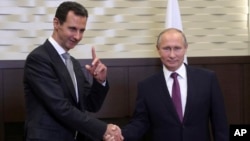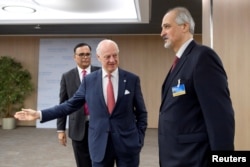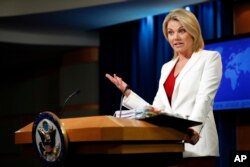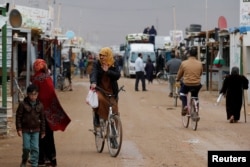Syrian President Bashar al-Assad expressed regret for the stalemate of U.N.-brokered intra-Syrian talks in Geneva last week but says he expects better results during the Russian-sponsored Sochi peace process to be held in February.
"Those with whom we are negotiating in Geneva - the Syrian opposition - do not represent the Syrian people. And after three years of negotiations, the Geneva talks did not achieve anything,” Assad told reporters in Damascus Monday morning, without ruling out a future role of the United Nations in the Syria peace process.
The intra-Syrian peace talks went through an eighth round in Geneva recently with little apparent progress — prompting discussions this week in New York between U.N. envoy to Syria Staffan de Mistura, U.N. Secretary-General Antonio Guterres, and the U.N. Security Council (UNSC).
De Mistura announced after concluding the talks last Thursday, that it was “a golden opportunity missed” and that he is disappointed by the ineffective U.N.-backed efforts to end hostilities.
The talks’ guideline was the 2015 unanimously adopted UNSC resolution 2254. The resolution endorses a peace map for Syria, focuses on setting in motion a new constitutional process, elaborates on governance and counter-terrorism, and the freeing of detainees as a confidence-building measure.
Blame game
De Mistura blamed the Syrian government for the disappointing result of last week's talks despite international efforts and diplomacy that preceded the negotiations in Riyadh that aimed to unify the opposition.
“I did not see therefore the government really looking to find a way to have a dialogue and negotiate in this round — I have to say, regrettably. I did see the opposition trying to,” he said.
U.S. Department of State spokesperson Heather Nauert deplored the “obstructionism and procrastination” of the Syrian regime.
Doubts have loomed since the first day of the negotiations as the Syrian government’s delegation hesitated to engage, preferring Russian-brokered talks. The Syrian Ministry for Foreign Affairs announced previously that Damascus welcomes the Sochi meeting.
Fate of Assad
Syrian government’s chief negotiator Bashar al-Jaafari blamed the opposition’s precondition for Assad to step down as the main reason for the failed peace talks.
The role of Assad in Syria’s transition has been the main point of contention between the opposing blocs. The Russia-Iran bloc refuses any talks on ousting the Syrian president, while for many years Western and Arab countries have backed the Syrian opposition’s demands for him to leave his post if peace talks were to move forward.
The humanitarian ordeal in Syria is getting worse. According to the United Nations, about 400,000 Syrians have been killed since 2011 and more than five million people have fled the country.
But the U.N. sees an opportunity arising from the humanitarian crisis.
“This crisis — one of the worst in the history of the U.N. — now has the potential, the real potential to move toward a genuine political process,” de Mistura said.



